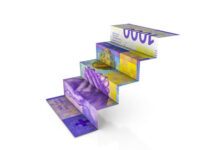Markets:
Inflation & recession fears are driving markets at the start of the new week. As was the case last week, the ‘bad news is good news for assets’-paradigm that facilitated a simultaneous rally in both bonds and equities during the mid-June/early-August era, doesn’t work anymore. On the contrary. Recent Fed (and ECB) comments ‘convinced’ bond investors that central banks’ anti-inflation campaign still has some way to go. Tentative signs on (US) inflation potentially topping are premature. At 8.5% Y/Y, returning inflation to the 2% target remains a distant Fata Morgana, especially as the US labour market remains extremely tight. So, there are few reasons for Fed Chair Powell to backtrack on his anti-inflationary rhetoric when addressing the Jackson Hole symposium on Friday. Last week’s rise in yields continues, but this time in a bear flattening rather than a steeping move. US yields are gaining 8 bps (2-y) over 4/2 bps (5-y/10-y) to 1.75 bps (30-y). Prospects for EMU inflation to cool anytime soon are even more uncertain despite elevated recession risks. Today’s new sharp leap in natural gas prices (Dutch reference contract jumping about 15%) suggests persistent upward pressure on corporates’ and consumers’ energy bills, annex risks of second round price increases. After Friday’s steep rise, German yields today add another 6/4 bps. EMU swap yields even gain 11/9 bps for the 2/10 year sector with the 30-y rising ‘only’ 5 bps. Intra-EMU spreads widen but the damage remains modest (10-y Italy vs Germany +3bps). UK interest rate markets to some extent decouple from the flatting trend in the US and EMU with Gilt yields rising between 8 bps (2-y) and 11 bps (30-y). The combination of recessionary fears with higher yields at the same time, proves a toxic cocktail for equities. The EuroStoxx 50 is ceding 2%. US indices open up to 1.7% lower (Nasdaq).
On FX markets, higher core higher yields in a risk-off context are keeping the dollar in pole position. The DXY index (108.40) is ‘gradually’ closing in on the mid-July cycle top (109.29). EUR/USD (1.00) intraday already filled bids below parity. A retest the 0.9952 YTD low is only a matter of time. Most smaller currencies are fighting an uphill battle but the picture isn’t unequivocal. Some commodity related currencies including the kiwi dollar (0.62) and the Aussie dollar (0.69) don’t lose further ground. The Norwegian krone also shows resilience with EUR/NOK (9.78) nearing the 9.76 support area. The Swiss franc (0.9580) still enjoys its (mainly European) safe haven prerogative, trading at the strongest level against the euro since the early 2015 spike. Cable (1.181) is nearing the 1.176 YTD low. At the same time, sterling rebounds against the euro. EUR/GBP (0.8465) for now fails to confirm a potential break out of the downtrend channel since mid-June.
News Headlines:
Belgian consumer confidence slightly improved in August, rising from -13 to -11, matching the June number which was the best (less worse) since February. The improved confidence stems from better expectations about the economic situation in general (-32 from -37) and increased savings intention (11 from 6). As far as their personal situation is concerned, households’ expectations regarding their financial situation are slightly more negative (-8 from -7), while they also appear less optimistic about future labour market developments (unemployment gauge up from 12 to 16). Belgian business confidence is due later this week, on Thursday.
The German Bundesbank published its monthly bulletin today. Inflation is about to reach 10% in the autumn as government measures expire. Higher minimum wage and a weaker currency add to price pressure with the inflation outlook remaining extremely uncertain because of commodity markets. Risks are skewed to the upside. Declining economic output in the winter months (and a recession) has become much more likely with the high degree of uncertainty over gas supplies and the sharp price increases likely to weigh heavily on households and companies.













